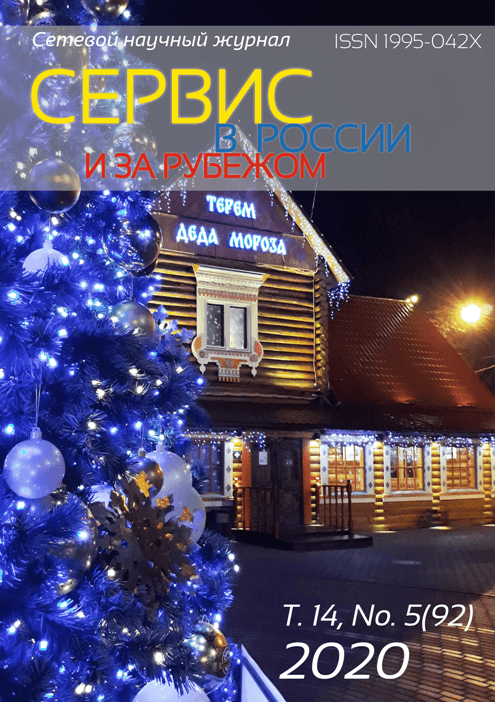Интеграция краудсорсинга в индустрию туризма
DOI:
https://doi.org/10.24411/1995-042X-2020-10508Ключевые слова:
краудсорсинг, туризм, социальные технологии, региональный туризм, краудфандинг, технологии краудсорсинга, инновации, социологический опросАннотация
В статье рассматривается интеграция краудсорсинга в туристическую индустрию. Исследуются преимущества и недостатки использования методов краудсорсинга в туризме. Представлены результаты социологического исследования использования краудсорсинга в индустрии туризма, а также возможности и основные барьеры для внедрения краудсорсинга в туристическую индустрии. В качестве выводов выделены основные направления использования краудсорсинга в туризме. Обоснована важность привлечения жителей региона за счет реализации различных краудсорсинговых проектов в туристическую сферу.
Скачивания
Библиографические ссылки
Babincev, V. (2014). Subkul'tura byurokratii [Subculture of bureaucracy]. Vlast' [Govenance], 1(12), 65-68 (In Russ.).
Gerasimova, E. V. (2013). Pravovoe regulirovanie obshchestvennogo kontrolya v Rossijskoj Federacii [Legal regulation of public control in the Russian Federation]. Vestnik Baltijskogo federal'nogo universiteta im. I. Kanta. Seriya: Gumanitarnye i obshchestvennye nauki [Bulletin of the Baltic Federal University named after Kant. Series: Humanities and Agricultural Sciences], 9(7) (In Russ.).
Bulavkina, L. V. (2012). Crowdsourcing in the marketing service. Marketing communications, 6, 47-48.
Golubev, E. V. (2014). Crowdsourcing project as a system: necessary elements, their interrelation, limitations and ways of overcoming. Marketing communications, 5, 24.
Gatautis, R. (2014). Crowdsourcing application in marketing activities. Procedia. Social and Behavioral Sciences, 110, 1243-1244.
Gula, I. (2013). Crowdsourcing in the tourism industry – Using the example of ideas competitions in tourism destinations. ISCONTOUR: Proceedings of the International Student Conference in Tourism Research, 57, 271.
Dinesh, K., & Veerbala, S. (2013). Exploring crowdsourcing: a viable solution towards achieving rapid and qualitative tasks. Library Hi Tech News.
Hekman, E. (2013). Crowdfunding and Online Social networks. Manchester Journal, 30, 14.
Ksenofontova, I. V. (2016). The role of the Internet in the development of the protest movement. Monitoring of public opinion.
Kurbatov, V. I. (2012). Network communities of the Internet as a social construct. Humanities of the South of Russia, 1(22), 33.
Pankrukhin, A. P. (2011). Crowdsourcing-seductive marketing aggressor-principles, content, technologies. Practical marketing, 58, 77-78 (In Russ.).
Howe J. (2010). Crowdsourcing: Why the Power of the Crowd is Driving the Future of Business. Crown Publishing Group, 10, 25.
Howe, J. (2012). Crowdsourcing: Collective intelligence as a business development tool. Alpina Publisher, 15, 370.
Rogova, А. V. (2015). Problems of introduction of crowdsourcing technology in public administration. International research journal, 2 (12), 55.
Rogova, А. (2017). Аssessment of awareness of the population of the region about the possibilities of crowdsourcing in regional management. Global scientific potential.
Simmons, J., & Nelson, L. (2011). Intuitive Biases in Choice versus Estimation: Implications for the Wisdom of Crowds. Journal of Consumer Research, 13, 145-146.
Загрузки
Опубликован
Как цитировать
Выпуск
Раздел
Лицензия
Copyright (c) 2020 Рогова А.В.

Это произведение доступно по лицензии Creative Commons «Attribution-NonCommercial-ShareAlike» («Атрибуция — Некоммерческое использование — На тех же условиях») 4.0 Всемирная.













